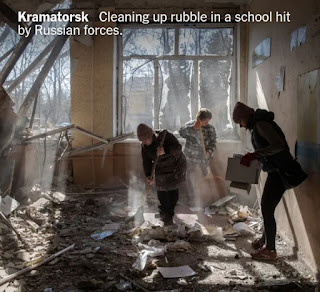Daily Briefing: War in UkraineUkraine Claims Strike Hit Russian Region Used to Launch Attacks
In a rare public acknowledgment of a cross-border strike, Ukrainian special forces said one of their drones had destroyed an unmanned watch tower in Russia’s Bryansk region. Here’s what we’re covering:
Ukraine claims a drone strike on a military target inside Russia.
Bakhmut, military aid and energy: What to watch for this week.
The election in Estonia delivers a vote of confidence for aid to Ukraine.
Ukrainian special forces said on Monday that they had destroyed an unmanned observation tower in Russia’s Bryansk region using a drone strike, a rare public acknowledgment of a cross-border attack that underscored Kyiv’s increasing willingness to directly hit Russian territory.
The timing of the strike was not clear but the Kraken unit, which reports to Ukrainian military intelligence, released a video that it said showed the assault on its Telegram channel on Monday.
It comes days after a brief armed incursion into a Russian border village in Bryansk by partisans claiming to fight for Ukraine, a rare known case of a raid inside Russia that the Kremlin described as a “terrorist” attack.
The Russian Volunteer Corps, a group opposed to President Vladimir V. Putin of Russia, claimed on Thursday that it briefly took control of the small village of Lyubichane, near the border with northeastern Ukraine. There were conflicting reports about the episode and what took place in Bryansk, but by the end of the day, the Russian authorities said the group had been driven back into Ukraine.
Russia and Ukraine share a land border extending more than 1,200 miles, including several hundred miles in the eastern Donbas region, parts of which are controlled by Moscow. Russia has used territories close to Ukraine — including Bryansk, along Ukraine’s northern border — to stage assaults, fire rockets, launch air assaults and mount other attacks throughout the war.
Officials in Kyiv have said they reserve the right to strike targets within Russia that they claim are used to attack Ukrainian towns and cities, but have promised not to use weapons supplied by Western allies for such assaults, since allies fear Moscow could view that as a provocation.
Over the course of the yearlong war, explosions and fires have been reported at oil depots, rail hubs and other military targets in Russia, but Ukraine has maintained a policy of deliberate ambiguity over such attacks, very rarely claiming responsibility.
Ukraine is believed to have struck inside Russia on several occasions, including in December, when the Engels Air Base, which is about 300 miles from the Ukrainian border, was attacked twice.
On Monday, the governor of the Russian region of Belgorod, which also borders Ukraine, said that Russian air defenses had shot down three missiles in the city of Novy Oskol. The Ukrainian authorities did not comment on the Russian claims.
But the Ukrainian government has expressed growing concern that Moscow is using the Bryansk region to launch drone assaults. The latest such attack, it said, took place before dawn on Monday. Alarms blared across Kyiv as air-defense guns echoed. The Ukrainian Air Force said it had detected at least 15 drones launched from Bryansk and claimed to have shot down 13.
Kyiv’s forces also continued to target Russian strongholds in occupied areas of Ukraine. Two large explosions were reported Sunday night in the Russian-occupied city of Melitopol in southern Ukraine, the city’s exiled mayor, Ivan Fedorov, said in an appearance on national television. Mr. Federov said that the Ukrainian military was still working to confirm the damage from the strike.
The Russian military has also continued to fire long-range missiles and drones at Ukraine’s cities and energy grid. The death toll from a Russian missile strike on an apartment building in the city of Zaporizhzhia last week has since risen to 13, Ukrainian officials said Sunday.
To prepare the public for the possibility of a retreat from the battered city that has become the focal point of Moscow’s offensive in Eastern Ukraine.
While Russian forces have not made significant territorial gains in their broader renewed offensive, they have placed significant resources into capturing Bakhmut, a city with limited strategic value that has been witness to the longest battle, nearly seven months, of the war.
Russian forces are now attacking the city from three directions in an effort to encircle Ukrainian troops, leaning heavily on assaults by lightly trained fighters including prison conscripts from the Wagner mercenary group. In an indication of the severity of the fighting in the east of the country and its broad geographical reach, the Ukrainian military’s General Staff said on Sunday that its forces had repelled 130 Russian attacks on Saturday.
President Volodymyr Zelensky paid tribute on Sunday to the “bravery, strength, and invincibility” of the Ukrainian soldiers fighting in the east. “It is one of the toughest battles,” he said in his nightly address.
While Mr. Zelensky last month vowed that Ukraine would not give up Bakhmut, calling it “our fortress,” military analysts suggest that what’s left of the city — only a few thousand civilians remain from a prewar population of roughly 70,000 — holds limited strategic value. Even so, capturing Bakhmut would be Russia’s most notable battlefield victory in months.




Comments
Post a Comment